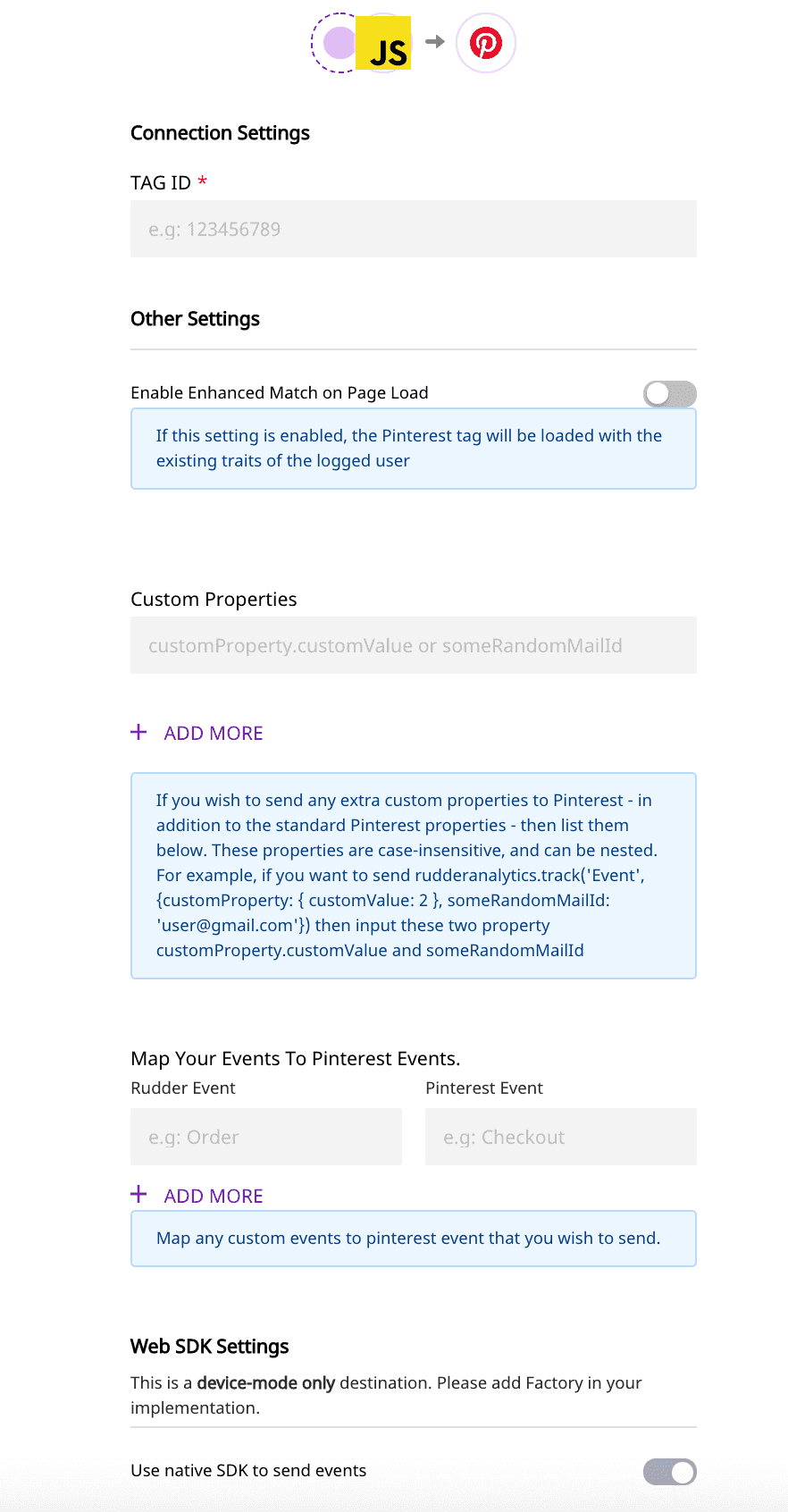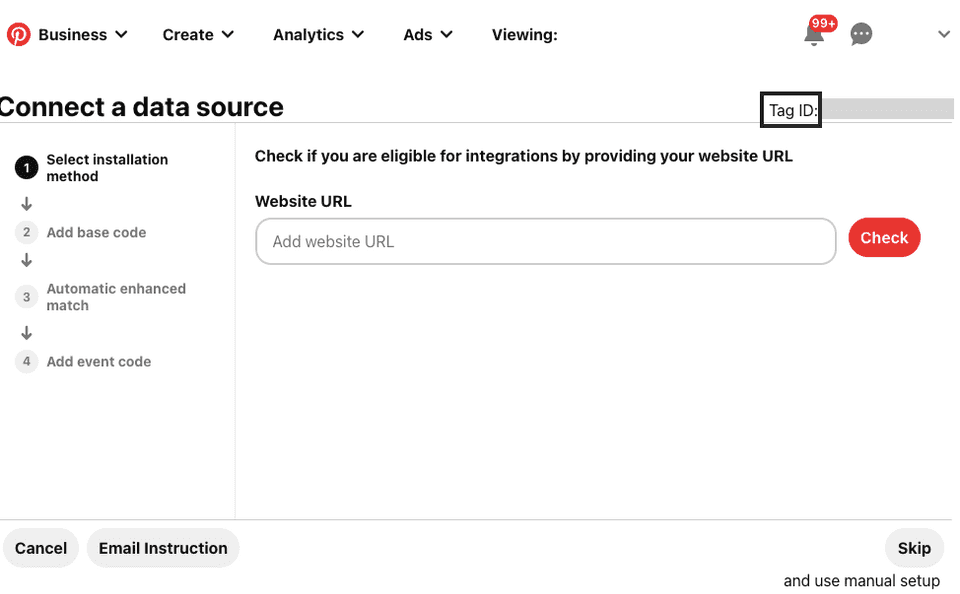Pinterest Tag
Step-by-step guide on sending your event data from RudderStack to Pinterest.
Pinterest Ads Tag allows Pinterest to track your visitors as well as their actions. It gives you a detailed conversion report related to all the customer activities like product signups, purchases, and more.
RudderStack supports Pinterest as a destination to which you can seamlessly send your event data using Pinterest's pintrk conversion tag.
Getting started
Before configuring Pinterest Tag as a destination in RudderStack, verify if the source platform is supported by Pinterest Tag by referring to the table below:
| Connection Mode | Web | Mobile | Server |
|---|---|---|---|
| Device Mode | Supported | - | - |
| Cloud Mode | - | - | - |
Once you have confirmed that the source platform supports sending events to Pinterest Tag, follow these steps:
- From your RudderStack dashboard, add a source. Then, from the list of destinations, select Pinterest Tag.
- Assign a name to the destination and click on Continue.
Connection settings
To successfully configure Pinterest Tag as a destination, you will need to configure the following settings:

- Pinterest Tag ID: Enter your Pinterest Tag ID.
For more information on finding the Pinterest Tag ID, refer to the FAQ section below.
- Custom Properties: Use this field to add any custom properties which should be sent to Pinterest.
For more information on using the custom properties, refer to the Custom properties section below.
Map Your Events To Pinterest Events: Use this field to map your event to a specific Pinterest event.
Use device-mode to send events: As this is a device mode-only destination, this setting is enabled by default and cannot be disabled.
Enable Enhanced Match on Page Load: This setting is enabled by default and attaches the hashed email address on the initial page load. Any further calls made to Pinterest will be an Enhanced Match.
When disabled, all the visits made to your site become anonymous. However, you can still identify any user by making the
identify()call.Enhanced Match
Rudderstack supports Pinterest Enhanced Match when the following conditions are met:
A user is identified every time they visit your site.
A user visits your site anonymously but is identified at a later stage by making an
identify()call.
If you use Rudderstack's identify() method to enable Pinterest’s Enhanced Match, you can only collect this information for successive events. Pinterest does not retroactively update the values for the past events.
Identify
The identify call lets you create new or update existing customers and record the traits about them like their name, email address, etc.
When you make an identify call with a user’s email address and traits, RudderStack triggers the Pinterest set() method. This saves the identification parameters to be sent with the next events, so it is recommended to set the values as early as possible.
If you make an identify call without email, the identification parameter will not be set.
A sample identify call is shown below:
rudderanalytics.identify("1hKOmRA4el9Zt1WSfVJIVo4GRlm", { name: "Alex Keener", email: "alex@example.com",})In the above example, the identification parameter will be set to alex@example.com and the successive calls will be an Enhanced Match.
After an identify call is made, nothing appears in the network tab in your browser or in the tag helper extension. However, a hashed value for an em parameter is added in the next event call, in a JSON object encoded in the URL.
Track
The track call allows you to capture user actions along with the properties associated with these actions.
A sample track call is shown below:
rudderanalytics.track("Order Completed", { checkout_id: "C324532", order_id: "T1230", value: 15.98, revenue: 16.98, currency: "INR"})RudderStack SDK sends the track event and any properties as custom properties to Pinterest.
Page
The page call lets you record your website's page views with any additional relevant information about the viewed page.
Pinterest's pintrk conversion tag sends any one of the following events when you make a page call:
ViewCategory: RudderStack sends this event if both thenameandcategoryfields are present. The below sample event contains both and is mapped to the Pinterest'sViewCategoryevent:
rudderanalytics.page("Best Seller", "Games", { path: "/best-seller/games/1", url: "https://www.estore.com/best-seller/games/1", title: "Best selling games offered by EStore", search: "estore bestseller games", referrer: "https://www.google.com/search?q=estore+bestseller", testDimension: "true",})PageVisit: RudderStack sends this event if onlynamefield is present and drops any additional properties. The below sample event contains onlynameand is mapped to the Pinterest'sPageVisitevent:
rudderanalytics.page("Best Seller", { path: "/best-seller/1",})E-Commerce
RudderStack supports e-commerce conversion tracking for Pinterest. You can use the E-commerce Events Specification guide for sending the events while instrumenting your site with the RudderStack SDK.
The following table mentions some sample track events mapped to the Pinterest events:
| RudderStack event | Pinterest event |
|---|---|
| Order Completed | Checkout |
| Product Added | AddToCart |
| Products Searched | Search |
| Product List Filtered | Search |
You can also track a custom event that you want to include in the conversion reporting. It will be mapped to a custom Pinterest event, for example:
rudderanalytics.track("custom event")Standard Pinterest events
Pinterest supports the following nine standard events that can be mapped and tracked for reporting. Any event apart from these is treated as a user-defined event.
CheckoutAddToCartPageVisitSignUpWatchVideoLeadSearchViewCategoryCustom
These events aren’t available for conversion reporting.
Property mapping
Rudderstack maps the following properties to the Pinterest properties:
| RudderStack property | Pinterest property |
|---|---|
| query | search_query |
| value | value |
| order_quantity | order_quantity |
| currency | currency |
| order_id | order_id |
| promo_code | promo_code |
| property | property |
| video_title | video_title |
| lead_type | lead_type |
| coupon | coupon |
The following properties are nested within the e-commerce products array:
| RudderStack property | Pinterest property |
|---|---|
| product_id | product_id |
| sku | product_id |
| name | product_name |
| price | product_price |
| category | product_category |
| variant | product_variant |
| quantity | product_quantity |
| brand | product_brand |
Custom properties
You can send the custom properties to Pinterest by adding them in the Custom Properties section while configuring the Pinterest destination in RudderStack.
A sample snippet with custom properties is shown below:
rudderanalytics.track("Event", { customProperty: { customValue: 2, }, someRandomMailId: "user@gmail.com",})For the above snippet, the following properties must be added in the Custom Properties section:
customProperty.customValuesomeRandomMailId
FAQ
How do I get the Pinterest Tag ID?
- Login to your Pinterest Ads dashboard.
- Click on the Ads dropdown and go to Conversions. It will open the Pinterest Tag Manager.
- Click on Get Started and you will see your Tag ID, as shown:

Contact us
For queries on any of the sections covered in this guide, you can contact us or start a conversation in our Slack community.